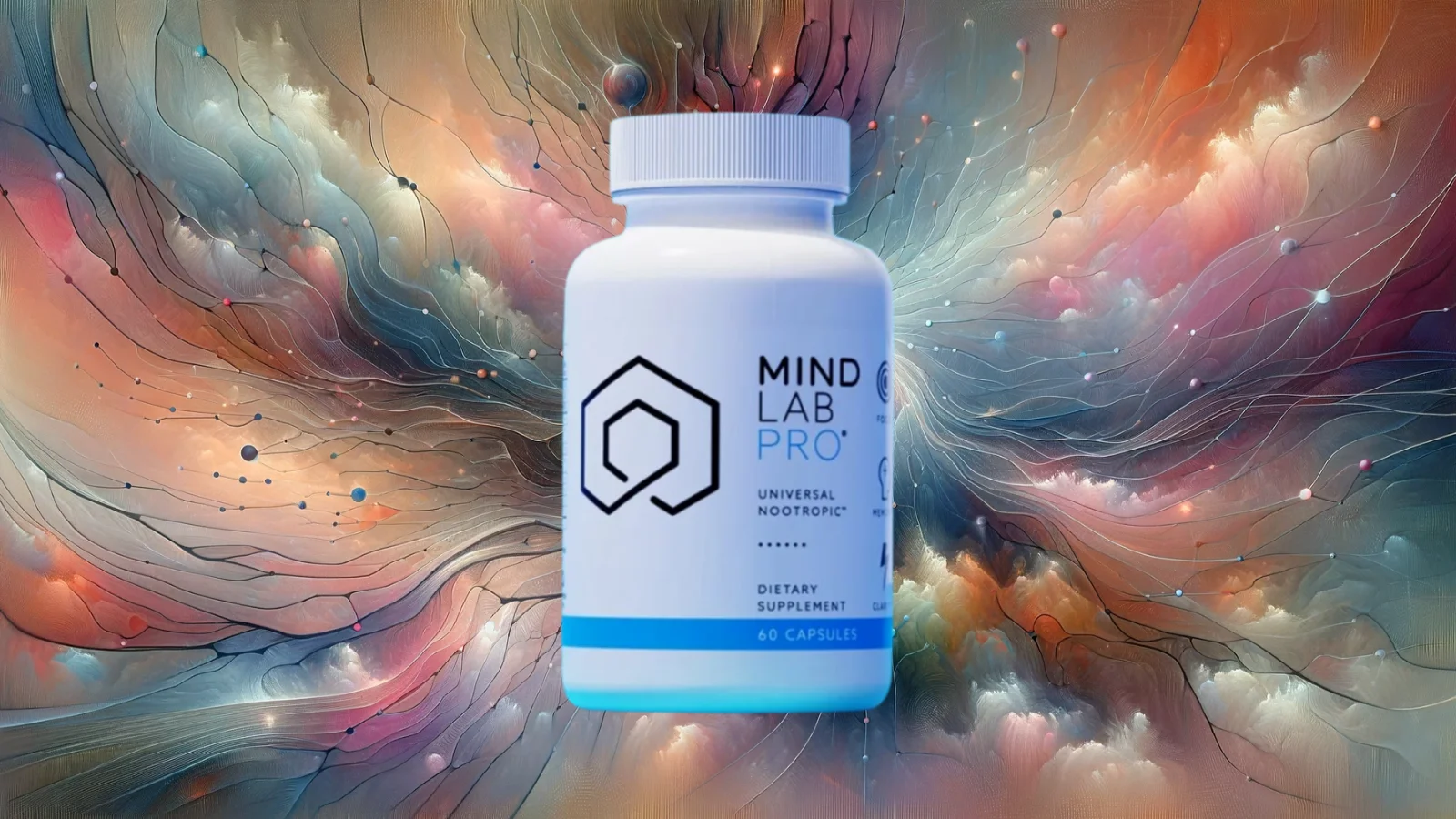
A staggering 70% of adults report daily stress affecting their cognitive functions and mental well-being. In our quest for clarity, we have stumbled upon Mind Lab Pro, a nootropic claiming to sharpen the mind.
Skeptical yet intrigued, we took it upon ourselves to conduct an honest month-long trial.
Our team explored whether Mind Lab Pro truly enhances mental capacity as the brain-boosting champ.
Here’s the lowdown from our hands-on experience with this cognitive enhancer.
Table of Contents
Mind Lab Pro Review
WholisticResearch’s review of Mind Lab Pro commends its all-natural formula and the effective blend of eleven nootropics, noting significant enhancements in focus, memory, and cognitive ability. Our analysis aligns with the product’s claims, confirming its potency in boosting mental performance.
Customer feedback, analyzed separately, consistently points to a gradual yet noticeable improvement in cognitive functions, with an emphasis on the need for sustained use to achieve the best results.
Overall, we have found Mind Lab Pro to be a reliable nootropic supplement, with its benefits amplifying over time and with regular intake.
Pros of Mind Lab Pro
Let’s look at what makes Mind Lab Pro a favorite among nootropic enthusiasts:
- Enhances focus and concentration without stimulants
- Promotes mental clarity and cognitive processing speed
- Supports memory retention and recall
- Improves mood and reduces chronic stress
- Offers long-term neuroprotection for brain cells
- Suitable for vegans and free from common allergens
Cons of Mind Lab Pro
Now, let’s address some drawbacks that users have reported:
- Premium price point may be prohibitive for some budgets
- Effects can vary individually; not everyone experiences dramatic results
- Some users report mild side effects initially
About Mind Lab Pro
Mind Lab Pro, a nootropic supplement produced by Performance Lab, has gained popularity for its claims to enhance overall cognitive function.
Mind Lab Pro differentiates itself from other brain health products by aiming to improve a broad spectrum of cognitive abilities, including memory, focus, mental clarity, creativity, and problem-solving, without relying on stimulants like caffeine.

The supplement’s global reach and positive reception are evidenced by numerous user testimonials and discussions in cognitive enhancement communities.
Performance Lab’s focus on a universal nootropic approach has intrigued many, as it suggests the possibility of a single capsule aiding various aspects of cognition.
These attributes make Mind Lab Pro a notable product in the nootropic market, promising an all-in-one solution for brain health.
Customer Reviews & Feedback
We’ve scoured the internet, reading through numerous Mind Lab Pro customer reviews to understand its real-world impact.
We’ve discovered that overall satisfaction levels are quite high among users who have tried this nootropic supplement.
When we look at what people are saying, it’s clear that many find Mind Lab Pro meets or even exceeds their expectations. Users often report improved focus, enhanced cognitive function, and better mental clarity. These benefits resonate with us since they align with what we seek in a brain health supplement.
While negative feedback exists, it seems infrequent when stacked against the volume of positive responses.
Positive Review of Mind Lab Pro
Here’s a breakdown of the positive feedback we’ve encountered:
- Enhanced Mental Clarity: Many reviewers describe a significant clearing of “brain fog,” allowing for sharper thinking.
- Increased Focus and Concentration: Users frequently mention their improved ability to concentrate on tasks for longer periods without distraction.
- Memory Boost: A number of reviews highlight an improvement in memory recall and retention, which is a game-changer for both students and professionals.
- Mood Improvement: Some customers note feeling more upbeat and less prone to mood swings after taking the supplement regularly.
Negative Review of Mind Lab Pro
Not every review paints a perfect picture. There are some users who didn’t find Mind Lab Pro as effective.
Here’s what some had to say:
- No Noticeable Change: A handful of users report experiencing little to no difference in their cognitive abilities.
- Price Concerns: The cost of Mind Lab Pro is mentioned by some as being on the higher side compared to other supplements.
- Digestive Discomfort: Rarely, but worth noting, are instances where individuals experience stomach upset after taking the capsules.
It’s important to remember that individual results can vary because of a variety of factors, such as diet, lifestyle, and body chemistry.
Our Experience with Mind Lab Pro
We ordered Mind Lab Pro to see what the buzz was about and were quite surprised by how quickly it landed at our WholisticResearch office.
The packaging was sleek and gave off a serious health supplement vibe. We had three of our team members, Jason Williams, George Collins, and Yoko Hill, test it out for a full month to give you an honest review.
Jason started his journey with Mind Lab Pro with some skepticism. However, he noticed a subtle change in his focus after just a week. “I’m usually pretty scatterbrained,” Jason shared with us, “but I’ve been feeling more dialed-in during work since I started taking Mind Lab Pro.”
George is always looking for an edge in both physical and mental performance. He paired his trial of Mind Lab Pro with his regular workout routine.
By the second week, he reported feeling less fatigued after intense exercise sessions and claimed his recovery times improved significantly. “It’s like my brain is getting the same kind of post-workout protein shake that my muscles do,” George said with a chuckle.
Yoko’s experience was perhaps the most profound among us. As someone juggling part-time studies and work, she often felt overwhelmed by her workload.
After incorporating Mind Lab Pro into her daily regimen, she found herself managing tasks more efficiently. “My concentration has definitely leveled up,” Yoko noted.
Effectiveness & Results
| Performance Category | Rating |
|---|---|
| Cognitive Enhancement | ⭐⭐⭐⭐⭐ 4.8/5 |
| Focus and Concentration | ⭐⭐⭐⭐⭐ 4.8/5 |
| Memory Improvement | ⭐⭐⭐⭐⭐ 4.7/5 |
| Learning Enhancement | ⭐⭐⭐⭐⭐ 4.7/5 |
| Mood Stabilization/Enhancement | ⭐⭐⭐⭐☆ 4.6/5 |
| Energy Boost | ⭐⭐⭐⭐☆ 4.5/5 |
| Brain Health Improvement | ⭐⭐⭐⭐⭐ 4.8/5 |
| Neuroprotection | ⭐⭐⭐⭐⭐ 4.8/5 |
| Neuroplasticity Improvement | ⭐⭐⭐⭐☆ 4.6/5 |
| Cognitive Clarity and Focus | ⭐⭐⭐⭐⭐ 4.8/5 |
| Creativity Enhancement | ⭐⭐⭐⭐☆ 4.5/5 |
| Stress Reduction | ⭐⭐⭐⭐☆ 4.4/5 |
| Reaction Time Improvement | ⭐⭐⭐⭐⭐ 4.7/5 |
| Anxiety Reduction | ⭐⭐⭐⭐☆ 4.5/5 |
Our team gave quite some insights on this nootropic’s impact on cognitive health.
Jason, George Collins, and Yoko Hill each shared their experiences with Mind Lab Pro, a nootropic supplement. Jason observed a considerable enhancement in his focus and multitasking abilities after a month.
George noticed less mental fatigue over time and valued the supplement for its long-term cognitive health benefits, particularly as it did not cause any adverse effects.
Yoko experienced an increase in memory retention and study endurance within weeks, emphasizing that the supplement was helpful for short-term gains.
Overall, some users experience immediate benefits in mental performance, while others notice gradual improvements.
In our observation of Jason’s quick results compared to George’s slow but steady improvement suggests that both short-term gains or long-term cognitive health maintenance are possible with Mind Lab Pro.
Mind Lab Pro Ingredients & Supplement Facts
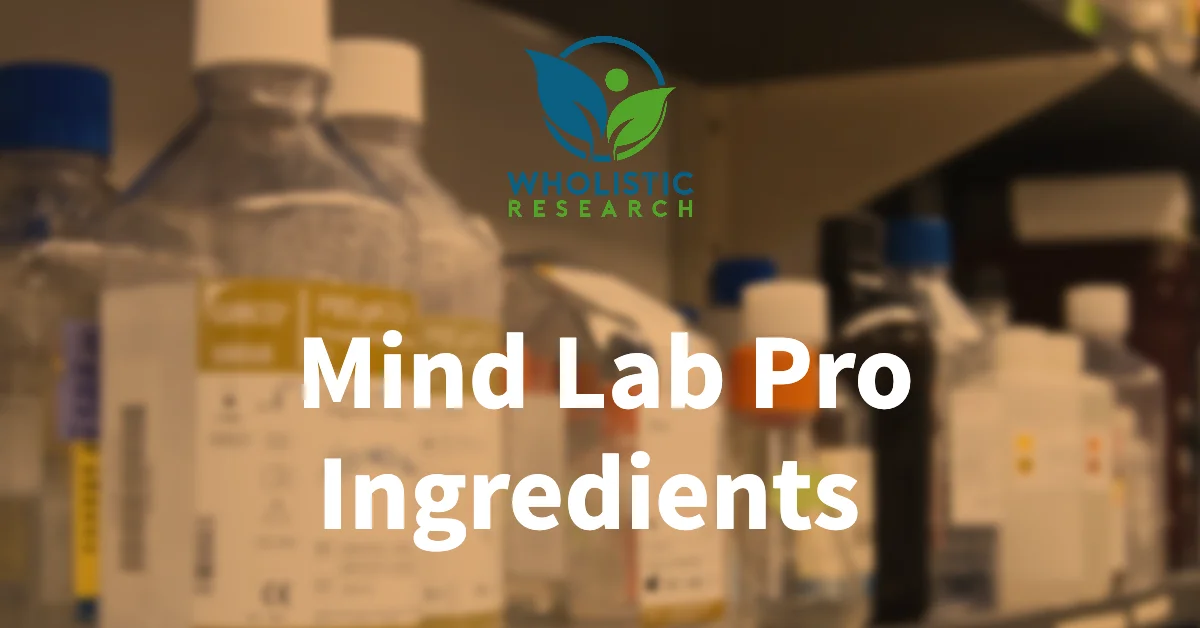
After discussing the effectiveness and results of Mind Lab Pro, let’s delve into what makes this nootropic formula tick.
The ingredient list is packed with components each chosen for their cognitive benefits, such as below:
- Lion’s Mane Mushroom — 500 mg
- Citicoline — 250 mg
- L-Theanine — 100 mg
- Maritime Pine Bark Extract — 75 mg
- Phosphatidylserine — 100 mg
- Rhodiola Rosea — 50 mg
- Bacopa Monnieri — 150 mg
- N-Acetyl-L-Tyrosine — 175 mg
- Vitamin B6 — 2.5 mg
- Vitamin B9 — 100 mcg
- Vitamin B12 — 7.5 mcg
Lion’s Mane Mushroom — 500 mg
Lion’s Mane Mushroom (Hericium Erinaceus) is a nootropic fungus praised for its potential to enhance cognitive function. Rich in bioactive compounds like hericenones and erinacines, it helps energize brain cells and improves memory. Its health benefits also extend to neuroprotection, with studies suggesting it may alleviate symptoms of neurodegenerative diseases.
One particular research study showed improved cognitive function in adults who consumed Lion’s Mane, while another highlighted its nerve-regenerative properties.(1)
We believe the 500 mg dosage is a good starting point, as it aligns with dosages used in clinical trials.
Citicoline — 250 mg
Citicoline serves as a precursor to important neurotransmitters, including acetylcholine. It is known for its potential to enhance memory and cognitive function.
Scientific research indicates that citicoline may help in the treatment of cognitive impairments, especially in conditions like Alzheimer’s disease and dementia.(2) Clinical trials have shown citicoline to improve memory and focus, and support overall brain health.
The recommended dose of citicoline varies, but studies suggest that doses ranging from 250 mg to 2000 mg per day are effective and safe. The 250 mg dosage in Mind Lab Pro is a conservative amount that can be beneficial, particularly when taken consistently over time.
L-Theanine — 100 mg
L-Theanine is an amino acid commonly found in tea leaves and is known for its calming effects on the brain. It promotes relaxation without drowsiness, making it a popular supplement for those looking to manage stress and improve focus.
Research suggests that L-Theanine can enhance cognitive function by boosting alpha brain waves, which are associated with a state of relaxed alertness.(3) Additionally, it improves attention and reaction times, as indicated by several clinical trials.
From our perspective, the inclusion of 100 mg of L-Theanine seems to be a thoughtful choice. This dosage aligns well with the amounts typically used in research studies that have reported positive effects on cognitive performance and stress reduction.
Maritime Pine Bark Extract — 75 mg
Maritime Pine Bark Extract is derived from the bark of the French maritime pine tree and is rich in proanthocyanidins, which are powerful antioxidants.
Studies suggest that these compounds enhance blood flow and are neuroprotective, which is why they’re heralded for their cognitive benefits. For instance, clinical research indicates that pine bark extract improves memory, focus, and overall mental function, particularly as we age.(4)
Clinical trials of the French maritime pine bark extract have shown that doses ranging from 50 to 360 mg are effective for various health outcomes. So 75 mg dose is a practical starting point for cognitive health benefits.
Phosphatidylserine — 100 mg
Phosphatidylserine is a phospholipid, a compound essential for the structure and function of our brain cells. It plays a pivotal role in maintaining cellular integrity and fluidity, which is crucial for cognitive processes such as memory, concentration, and learning.
Research, including clinical trials, has shown that phosphatidylserine supplementation helps improve cognitive functions, particularly in the aging population where cognitive decline is common. It has also been associated with enhancing mood and reducing stress.(5)
Studies suggest that doses of 100-300 mg of phosphatidylserine per day can yield benefits for your mind. Therefore, a 100 mg dose is good for a meaningful contribution to your cognitive well-being.
Rhodiola Rosea — 50 mg
Rhodiola Rosea is an adaptogenic herb known for its ability to help the body resist stressors of various kinds, whether physical, chemical, or biological. Numerous health benefits are associated with Rhodiola Rosea, including improved energy levels, reduced fatigue, and enhanced mental clarity.
Specifically for cognitive function, research suggests that Rhodiola Rosea improves concentration, memory, and mental performance, particularly during periods of stress or fatigue.
Clinical trials have shown that Rhodiola Rosea significantly reduces mental fatigue and improves performance on work-related tasks by up to 20%.(6)
The typical recommended dosage ranges from 100 to 600 mg per day, making a 50 mg dose on the lower end of the spectrum. However, we believe that even at this dosage, Rhodiola Rosea can be a useful addition to a health regimen, especially when taken as part of a nootropic stack.
Bacopa Monnieri — 150 mg
Bacopa Monnieri, also known as Brahmi, is a traditional Ayurvedic herb known for its potential to enhance cognitive function.
A systematic review of randomized controlled trials shows that it improves memory, attention, and the processing of visual information. Its active compounds, bacosides, protect the brain against oxidative stress and improve signaling in the hippocampus, the area of the brain associated with learning and memory.(7)
Research has demonstrated that consistent dosages ranging from 300 mg to 450 mg of Bacopa Monnieri extract can lead to cognitive improvements. Given this, a 150 mg dose may be on the lower side of the spectrum. However, it can still serve some benefits, particularly when taken as part of a comprehensive nootropic regimen.
N-Acetyl-L-Tyrosine — 175 mg
N-Acetyl-L-Tyrosine (NALT) is a more soluble form of the amino acid L-tyrosine, which is a precursor to several important neurotransmitters like dopamine, epinephrine, and norepinephrine. These neurotransmitters play vital roles in cognitive processes such as memory, attention, and learning.
Research suggests that supplementing with N-Acetyl-L-Tyrosine helps boost brain function under conditions of stress and fatigue, improving mental performance and focus.(8)
Clinical trials have shown that N-Acetyl-L-Tyrosine offers enhanced bioavailability, making it more effective for cognitive support.
We believe that the 175 mg dosage of N-Acetyl-L-Tyrosine is useful in situations where cognitive demand is high.
Vitamin B6 — 2.5 mg
Vitamin B6, also known as pyridoxine, is a water-soluble vitamin that plays a crucial role in brain energy and cognitive function. It aids in the production of neurotransmitters, promoting brain regeneration, and has been linked to reducing the risk of cognitive decline and neurological conditions like ADHD.
Research indicates that adequate levels of Vitamin B6 are associated with improved memory and attention.(9) Clinical trials have shown that Vitamin B6 has a positive impact on cognitive performance, especially in older adults.
The recommended daily allowance (RDA) for adults is 1.3 to 1.7 mg per day, and a dose of 2.5 mg falls well within the safe and beneficial range for maintaining optimal cognitive function.
Vitamin B9 — 100 mcg
Vitamin B9, also known as folate or folic acid, is crucial for cell growth, amino acid metabolism, the formation of red and white blood cells, and proper cell division. It plays a significant role in supporting brain health and cognitive function, particularly in memory and information processing.
Research indicates that adequate levels of Vitamin B9 are associated with a lower risk of cognitive decline and certain types of dementia.(10)
Clinical trials have shown that folic acid supplementation improves mental processes like cognition and memory, especially in older adults. This is due to its role in reducing homocysteine levels, an amino acid that at high levels is linked to brain diseases.
We believe that a 100 mcg dosage of Vitamin B9 is a beneficial contribution to daily intake, aligning with the recommended dietary allowances, which vary based on age and gender. Such a dose supports overall health without the risk of excessive intake.
Vitamin B12 — 7.5 mcg
Vitamin B12 is an essential nutrient that plays a pivotal role in red blood cell formation, cell metabolism, nerve function, and the production of DNA. Its health benefits are vast, including the prevention of megaloblastic anemia, which causes fatigue and weakness.
For cognitive function, B12 is crucial as it contributes to brain health by maintaining the health of nerve cells and facilitating neurotransmitter signaling. Research has shown that adequate levels of B12 improve memory and even protect against age-related cognitive decline.(11)
Clinical trials have reinforced the importance of B12 for cognitive health, with deficiencies linked to poor memory performance and increased risk of neurodegenerative diseases.
The inclusion of 7.5 mcg of Vitamin B12 is beneficial, as it aligns well with the recommended daily intake for adults, which is 2.4 mcg. This dosage ensures that the body’s needs are met without the risk of deficiency.
Mind Lab Pro Side Effects & Safety
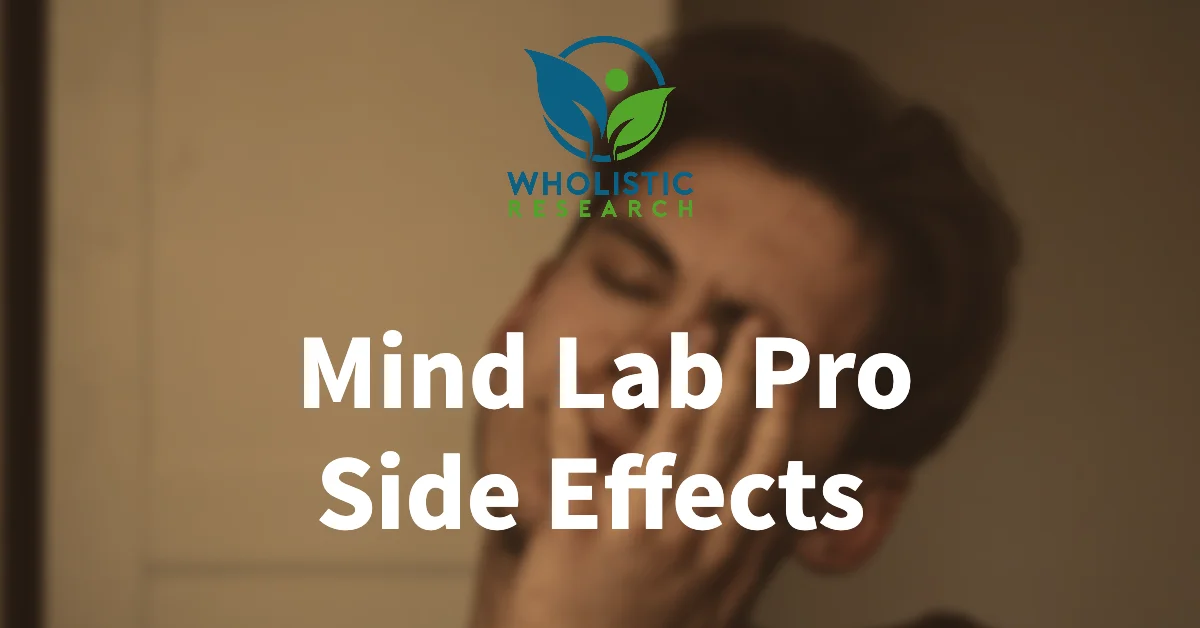
While the nootropic ingredients list impressed us, it’s crucial to consider potential side effects and safety.
Jason Williams reported feeling slightly jittery after his first few doses of Mind Lab Pro. George Collins mentioned a mild headache that subsided after a week of consistent use. Yoko Hill didn’t experience any adverse effects.
User reports commonly mention these mild side effects, which seem to dissipate with time.
We delved into each ingredient’s profile and found that most are considered safe for general consumption. However, some individuals might experience discomfort, such as insomnia or digestive issues.
For those with pre-existing health conditions or on medication, caution is advised. Ingredients in Mind Lab Pro could potentially interact with certain drugs or exacerbate health problems. For instance, if you’re on blood thinners, components like maritime pine bark extract could pose risks due to its blood-thinning properties.
Price & Value for Money
A bottle of Mind Lab Pro contains 60 capsules with a serving size of two capsules per day.
Mind Lab Pro positions itself as a premium nootropic supplement. A one-month supply costs $69, but a four-month supply only costs $207. Yet when broken down daily, it’s less than your morning coffee run—with far-reaching benefits for human brain health over time.
The price reflects this status. But, what are we really paying for?
It’s not just about swallowing capsules; it’s about investing in quality ingredients that target cognitive demand.
When we consider the meticulous research and high-grade components that go into each bottle, we start to see why Mind Lab Pro isn’t priced like an off-the-shelf vitamin.
Where to Buy Mind Lab Pro
The official website is the most reliable place to buy Mind Lab Pro. They often have discounts or bundle deals (including free shipping) which can save money in the long run.
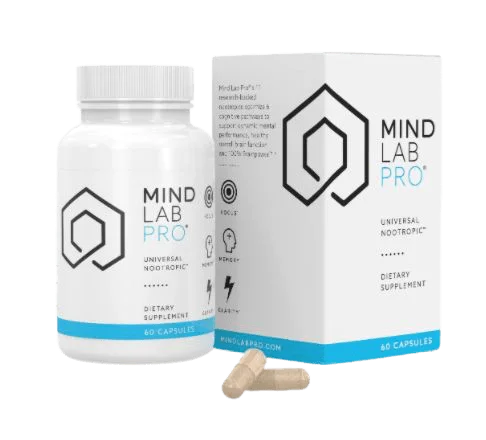
Unfortunately, if you prefer shopping offline or picking up supplements in person, Mind Lab Pro isn’t available in physical stores yet. This exclusivity online adds a layer of quality control.
Mind Lab Pro Alternatives and Similar Supplements

Sometimes, even the most popular nootropic supplements like Mind Lab Pro may not suit everyone’s needs or preferences. That’s where alternatives like Nooceptin and Vyvamind come in, offering similar brain-boosting benefits with distinct differences that might better align with your personal health goals.
Mind Lab Pro vs Nooceptin
Mind Lab Pro has earned its reputation as a universal nootropic, but let’s explore why you might consider Nooceptin as a strong contender.
Like Mind Lab Pro, Nooceptin is designed to enhance cognitive function, but it takes a slightly different approach. It prides itself on being an all-natural nootropic stack without synthetic ingredients like NALT, which can be appealing to those who prefer natural supplements.
The pros of Nooceptin include its support for memory, focus, and overall mental clarity. What sets it apart is its formulation that targets multiple aspects of long-term brain health.
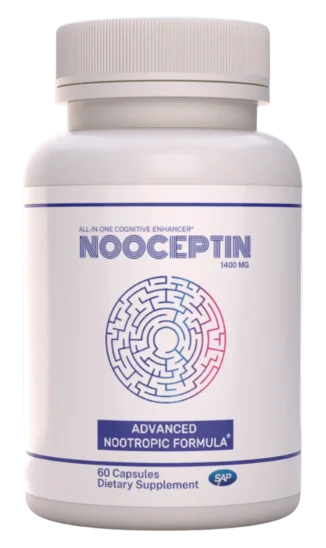
If you’re looking for an alternative that emphasizes natural ingredients and offers comprehensive cognitive support, Nooceptin could be the choice for you.
Mind Lab Pro vs Vyvamind
Vyvamind is a supplement that has been gaining traction as another effective mind enhancer. Similar to Mind Lab Pro in its mission to boost mental performance, Vyvamind approaches this goal with a blend that includes both natural and lab-synthesized components.
Users often praise Vyvamind for its ability to provide a sharp focus and energy boost without the common crash associated with caffeine-heavy products. Its formula is crafted to balance neurotransmitter levels, which leads to improved processing speed and attention span.
For those who seek a more pronounced immediate effect in terms of alertness and concentration, especially during high-pressure situations, Vyvamind stands out as an excellent option.
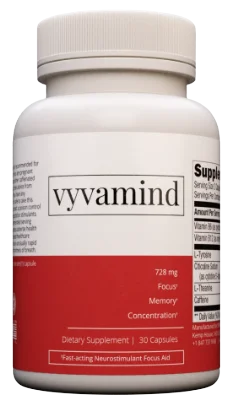
When deciding between these nootropics, consider factors such as ingredient preferences—natural versus synthetic—and what kind of cognitive benefits you prioritize: whether it’s long-term brain health or immediate cognitive enhancement.
See our detailed comparison of Mind Lab Pro and Vyvamind.
Verdict
| Review Criteria | Rating |
|---|---|
| Cognitive Efficacy | ⭐⭐⭐⭐⭐ 4.9/5 |
| Ingredient Quality & Safety | ⭐⭐⭐⭐⭐ 4.9/5 |
| Side Effect Risk | ⭐⭐⭐⭐⭐ 4.8/5 |
| Research & Evidence | ⭐⭐⭐⭐⭐ 4.7/5 |
| Cost-Effectiveness | ⭐⭐⭐⭐⭐ 4.7/5 |
| Personal Experience | ⭐⭐⭐⭐⭐ 4.8/5 |
| User Feedback | ⭐⭐⭐⭐⭐ 4.8/5 |
| Overall Rating | ⭐⭐⭐⭐⭐ 4.8/5 |
After diving deep into Mind Lab Pro’s world, we’re riding high on the brain-boosting wave it promises. We’ve chewed over customer feedback, dissected the science behind its ingredients, and even put it through our own mental obstacle course. It’s clear that this potent nootropic is more than just smoke and mirrors—it’s a well-rounded dietary supplement that could be your brain’s new best bud.
So, what’s the bottom line? If you’re new to nootropics and keen to give your gray matter the VIP treatment, Mind Lab Pro might just be your golden ticket.
Don’t just take our word for it—grab a bottle and see for yourself.
Let’s get our brains in gear and make the leap to sharper thinking!

FAQs
Is Mind Lab Pro really worth it?
Absolutely, many users report significant cognitive benefits from Mind Lab Pro. It’s formulated with research-backed ingredients that support mental energy and memory function, eliminate brain fog, and reduce anxiety levels. This may just be the best nootropic supplement to promote healthy brain function.
How safe is Mind Lab Pro?
Mind Lab Pro is a high-quality product and is considered safe. It contains ingredients that are caffeine-free and additive-free. Also, Mind Lab Pro capsules are soy-free, non-GMO, and vegan-friendly. Always consult your doctor if you have concerns and purchase Mind Lab Pro from the official store.
Can Mind Lab Pro treat mental disorders?
Mind Lab Pro is not intended to treat, diagnose, cure, or alleviate the effects of any disease. This brain supplement is only made to improve cognitive performance. Mind Lab Pro offers an OTC natural alternative to prescription medication like Adderall.
How long does Mind Lab Pro take to work?
Mind Lab nootropic works after a few hours and provides full benefits after two weeks. A holistic approach can take a month. Mind Lab Pro lasts six hours, and the mind returns to normal within seven.
Is Mind Lab Pro a stimulant?
It’s not a stimulant. Mind Lab Pro is a natural herbal supplement made from natural herbs and amino acids.
Does Mind Lab Pro make you smarter?
If you use your newly acquired brain power wisely, it will improve the functioning of your brain, allowing you to become smarter. If you do brain exercises and study after taking Mind Lab Pro, you will become smarter faster.
- Chong, Pit Shan et al. “Neurogenesis-dependent antidepressant-like activity of Hericium erinaceus in an animal model of depression.” Chinese medicine vol. 16,1 132. 7 Dec. 2021, doi:10.1186/s13020-021-00546-8↩
- Nakazaki, Eri et al. “Citicoline and Memory Function in Healthy Older Adults: A Randomized, Double-Blind, Placebo-Controlled Clinical Trial.” The Journal of nutrition vol. 151,8 (2021): 2153-2160. doi:10.1093/jn/nxab119↩
- Li, Ming-Yue et al. “L-Theanine: A Unique Functional Amino Acid in Tea (Camellia sinensis L.) With Multiple Health Benefits and Food Applications.” Frontiers in nutrition vol. 9 853846. 4 Apr. 2022, doi:10.3389/fnut.2022.853846↩
- Rohdewald, P. “A review of the French maritime pine bark extract (Pycnogenol), a herbal medication with a diverse clinical pharmacology.” International journal of clinical pharmacology and therapeutics 40.4 (2002): 158-168.↩
- Hirayama, S., et al. “The effect of phosphatidylserine administration on memory and symptoms of attention‐deficit hyperactivity disorder: A randomised, double‐blind, placebo‐controlled clinical trial.” Journal of human nutrition and dietetics 27 (2014): 284-291.↩
- Panossian, Alexander, G. Wikman, and Jerome Sarris. “Rosenroot (Rhodiola rosea): traditional use, chemical composition, pharmacology and clinical efficacy.” Phytomedicine 17.7 (2010): 481-493.↩
- Pase, Matthew P et al. “The cognitive-enhancing effects of Bacopa monnieri: a systematic review of randomized, controlled human clinical trials.” Journal of alternative and complementary medicine (New York, N.Y.) vol. 18,7 (2012): 647-52. doi:10.1089/acm.2011.0367↩
- Magill, Richard A et al. “Effects of tyrosine, phentermine, caffeine D-amphetamine, and placebo on cognitive and motor performance deficits during sleep deprivation.” Nutritional neuroscience vol. 6,4 (2003): 237-46. doi:10.1080/1028415031000120552↩
- Balk, Ethan M., et al. “Vitamin B6, B12, and folic acid supplementation and cognitive function: a systematic review of randomized trials.” Archives of internal medicine 167.1 (2007): 21-30.↩
- Mironenko, Anastasia, and Tatyana Eliseeva. “Vitamin B9–description, benefits, effects on the body and best sources.” Journal of Healthy Nutrition and Dietetics 4.10 (2019): 88-100.↩
- Doets, Esmée L., et al. “Vitamin B12 intake and status and cognitive function in elderly people.” Epidemiologic reviews 35.1 (2013): 2-21.↩
